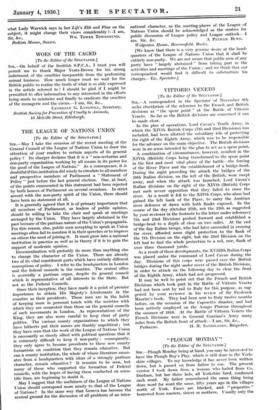THE LEAGUE OF NATIONS UNION [To the Editor of the
SPECTATOR.]
Sra,—May I take the occasion of the recent meeting of the General Council of the League of Nations Union to draw the attention of your readers to certain aspects of its general policy ? Its charger declares that it is a "non-sectarian and non-party organization working by all means in its power for the good of the League of Nations." As a consequence, it is doubtful if this institution did wisely to circulate to all members and prospective members of Parliament a "Statement of Policy" just before the last general election. One, at least, of the points enumerated in this statement had been rejected by both houses of Parliament on several occasions. In strict accord with the non-party spirit of the Union, there should have been no statement at all.
It is generally agreed that it is of primary importance that all members of Parliament, as leaders of public opinion, should be willing to take the chair and speak at meetings arranged by the Union. They have largely abstained in the past because of the partisan nature of the Union's propaganda. For this reason, also, public men accepting to speak at Union meetings often fail to mention it in their speeches or to impress on others the need of joining it. It must grow into a national institution in practice as well as in theory if it is to gain the support of moderate opinion.
Decentralization will probably do more than anything else to change the character of the Union. There are already two of its vital constituent parts which have entirely different conceptions of policy. I refer to the headquarters in London and the federal councils - in the counties. The central office is avowedly a partisan organ, despite its general council which is representative of all interests in the State. But not so the Federal Councils.
Since their inception, they have made it a point of premier importance to obtain His Majesty's Lieutenants in the counties as their presidents. These men are in the habit of keeping more in personal touch with the societies with which they are connected than those on the general councils of such movements in London. As representatives of the King, they are also more careful to keep clear of party politics. The various county organizations to which they have hitherto put their names are frankly unpolitical ; but they have seen that the work of the League of Nations Union is necessarily so closely allied with political questions that it is extremely difficult to keep it non-party : consequently, they only agree to become presidents to these new county formations on condition that they remain educative. But can a county institution, the whole of whose literature eman- ates from a headquarters with ideas of a strongly partisan character, remain educative ? It remains to be seen, but many of those who supported the formation of Federal councils, with the hopes of having them conducted on scien- tific lines, are beginning to doubt it.
May I suggest that the usefulness of the League of Nations Union should correspond more nearly to that of the League of Nations ? In the same way that Geneva has become the neutral ground for the discussion of all problems of an inter-
national character, so the meeting-places of the League of Nations Union should be acknowledged as the centres for public discussion of League policy and League outlook.—I am, Sir, &c. A PELHAM BURN. Widgenton House, Beaconsfield, Bucks.
[We know that there is a very genuine desire at the head- quarters of the League of Nations Union that it shall be entirely non-party. We are not aware that public men of any party have "largely abstained" from taking part in the activities and meetings of the Union ; and we think that our correspondent would find it difficult to substantiate his charges.—En. Spectator.]










































 Previous page
Previous page